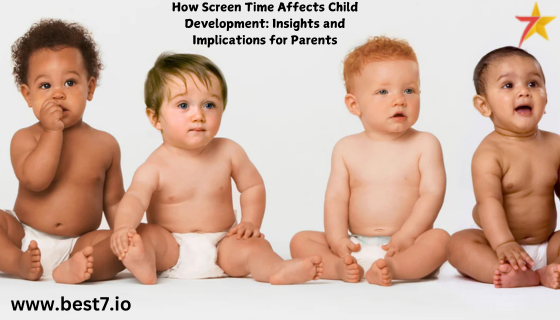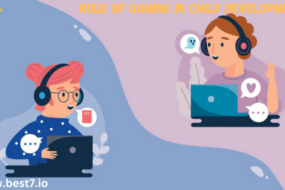
The problem of screen time and how it affects child development is becoming increasingly important for parents, educators, and psychologists. Given the growing role of technology in every aspect of people’s lives, they cannot help but affect the process of child raising and the cognitive, emotional, and social development of children. This article provides insights into how screen time can affect the growth of children while considering the conclusions drawn from the analysis of previous case studies. Future projections on how to use this information to promote healthy screen use are also reflected.
1. The Effects of Screen Time on Cognitive Development
Cognitive developments are influenced by screen time. Some are positive, while others are negative. The American Academy of Pediatrics has always promoted the importance of quality and quantity of media, advising parents to prefer educational to recreational and limit screen time. According to research the University of California conducted in 2019, children who watched high-quality educational media programming had improved 30% of their cognitive skills compared to their peers who had spent the show time watching other things away from the screen. There are several factors in play:
1. Content Quality: educational content, including videos, applications, and games, encourages the development of cognitive skills and serves as an instrument for knowledge acquisition and learning.
2. Screen Time Duration—the longer the screen time, the poorer the performance at school is, prompting attention difficulties, whereas a short period of screen usage likely has no impact on cognitive development.
3. Interactive Media—such games and applications help improve problem-solving skills and critical thinking.
4. Screen multitasking: children who use several screens at a time are less likely to focus and remember information.
5. Passive Consumption: Watching a TV show without interacting with the screen can decrease cognitive engagement. Mindless consumption of media can lead to a decrease in cognitive outcomes for young children.
6. Parental Involvement: Active parental involvement in young children’s media activities can provide a context for discussion and improve the cognitive outcomes for the young child.
7. Future Projections: By 2025, it is projected that 60% of the parents will choose high-quality educational media for their young children to optimize cognitive development during screen time.
The future of content indicates that the emphasis on high-quality educational media will continue to grow over the following decades. Coincidentally, children will be focusing on media content at earlier ages, which will foster optimum development of cognitive skills.
Projections indicate that the growth in cognitive development for educational content will rise to 40% by 2030, and more young children will be screened for educational and entertainment content. Cognitive developments refer to a child’s ability to understand the world around them, how to interact with the world, and the outcome of these interactions in the environment.
2. Emotional Development And Screen Time
The relationship between screen time and its impact on a child’s emotional development is complex, with constructive and destructive influences. Positive influences such as studies have indicated that preschool children exhibited an array of emotional understanding after engaging with age-appropriate digital media content.
A case study conducted in the year 2020 by the Journal of Child Psychology examined that children in the kindergarten that interacted with the emotional literacy from the digital stories exhibited a 25% increase in emotional understanding. The following are key influencers of the emotional development of the child related to screen time consumption:
Media Content: Content that engages in the portrayal of emotions can increase the understanding level of the children.
Isolation Risks: Excessive screen time can lead to isolation and feelings of loneliness among children, which inhibit emotional development.
Role Modeling: Parents are role models for their children, and their screen habits will influence the screen habits of their children.
Screen Addiction: When children use screens to soothe themselves emotionally, they are at risk of screen addiction. This activity will stunt their emotional growth and reliance.
Shared viewing experiences: Support numerous cognitive and emotional development-oriented discussions on the characters or ethical issues raised by the content with the child during co-viewings.
Future Projections By 2025, the screen addiction rate among children is estimated to increase by 15%, leading to higher emotional challenges.
Parents and guidance: Media consumption will be guided by parents, who will pave the way for children’s emotional growth by spending more quality time talking and listening.
The same is expected to happen during the following years, as 70% of parents are projected to seek tools and resources to manage their emotional and media consumption balance.
3. Social Competence And Relationship Skills
Media consumption is seen as having a detrimental effect on children’s social skills, which has long been a growing concern with parents and educators. Learning these skills is an important part of childhood, as they form the foundation for the child’s future relationships with others. A study conducted in 2021 at the University of Minnesota stated that children taking part in more than 3 hours per day of screen time showed a 40% decline in social competence compared to children with a balanced screen use. The factors causing this deficit included:
Face-to-face interaction : The more time a child spends on their device, the less time they have engaging with peers, limiting their face-to-face interactions and inhibiting their competence.
Online Communication: virtual conversation devoid of meaningful contact and reactions that can only be seen during in-person or FaceTime chats.
Peer Relationships Socialization: can involve extensive screen time, which helps establish trust and teamwork.
Understand Culture and Diversity Media content : can showcase different lives, experiences, and representational points. Furthermore, various apps expose the user to different people from different places.
Conflict Resolution: Skills Spending hours behind a screen can stimulate alienation, and the consumer might miss a developing dispute resolution skill.
Future Predictions: By 2030, 30% of children are expected to display the social challenges associated with media overuse.
Parental Involvement: Social activities started by parents on a schedule and with valid topics can mediate the impacts of screen time and support expected social gains.
It is estimated that a 20% increase in social skills in children will occur by 2035 when both parents and school educators put more efforts into promoting face-to-face communication.
4. Parenting Tips to Support Healthy Screen Use
Considering the potential effects of screen time, it is essential for parents to focus on strategies that promote the proper use of technology and contribute to a child’s development. There are several key tips that families should follow to implement efficient parenting strategies and address challenges associated with screen use. These tips include:
Setting Limits. Parents should agree with their children on time limits related to their screen use, defining this limitation and advising them to find solutions to balance their daily routines.
Active Use. Parents should encourage their children to interact with media in an active way, use programs and applications that are connected to learning and exploring the world instead of passively consuming information on other networks, and play games without any activities.
Modeling Behavior. Parents should avoid severe restrictions in screen use but should serve as role models not to overuse gadgets through their own habit of reasonable screen use.
Plan Development. It is recommended to develop a family plan, which will include a structure for different types of media uses and possible assimilation of proper media, including discussions of content that can be consumed.
Physical Activities. Parents should also motivate a child for physical activities that are essential for strength and health, which may reduce the time spent on screens to balance it with outdoor physical activities.
Family Time. When media use is time for the whole family, children can be involved in settings together, so they do not have access to media channels that need to be avoided.
Education and Monitoring. It is mandatory to educate children on the quality of media and its appropriateness. The discussion of content quality is crucially important.
Content. Levels of restriction with age-appropriate content.
It is estimated that by 2025, 75% of parents will create a structured media plan to develop their children in various areas.
In conclusion, comprehending the linkage between screen time and child development is vital for parents in their attempts to assist their kids in growing in a modern, technological world. Therefore, by focusing on a healthy approach to media, encouraging open communication with the children, and displaying role model behavior, parents will create the atmosphere in which the process of emotional, cognitive, and social growth will develop.
Since the current statistics indicate the necessity of reducing time spent using screens, it is expected that further research will require an even greater need for balancing screen consumption and promoting healthier approaches to using digital technology among the future generations.












